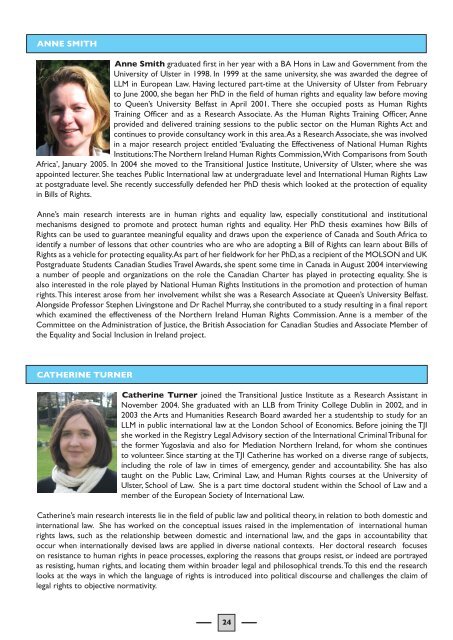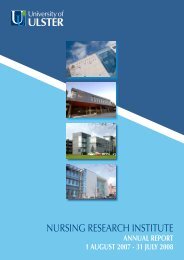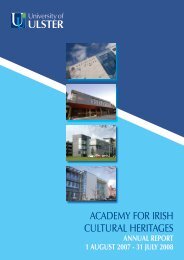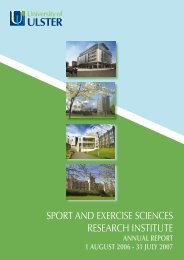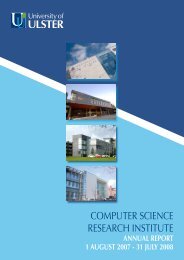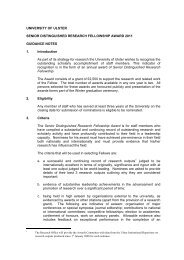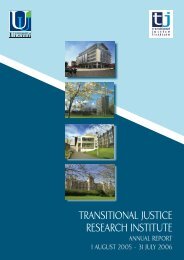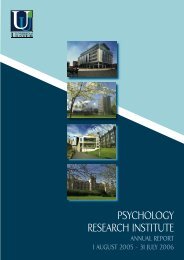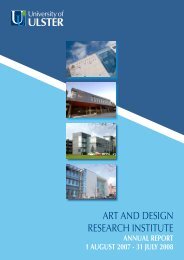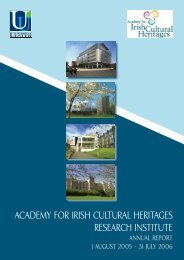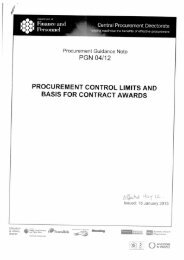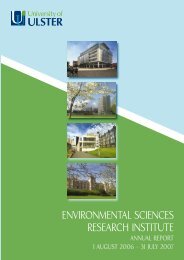TRANSITIONAL JUSTICE INSTITUTE - Research - University of Ulster
TRANSITIONAL JUSTICE INSTITUTE - Research - University of Ulster
TRANSITIONAL JUSTICE INSTITUTE - Research - University of Ulster
You also want an ePaper? Increase the reach of your titles
YUMPU automatically turns print PDFs into web optimized ePapers that Google loves.
ANNE SMITHAnne Smith graduated first in her year with a BA Hons in Law and Government from the<strong>University</strong> <strong>of</strong> <strong>Ulster</strong> in 1998. In 1999 at the same university, she was awarded the degree <strong>of</strong>LLM in European Law. Having lectured part-time at the <strong>University</strong> <strong>of</strong> <strong>Ulster</strong> from Februaryto June 2000, she began her PhD in the field <strong>of</strong> human rights and equality law before movingto Queen’s <strong>University</strong> Belfast in April 2001. There she occupied posts as Human RightsTraining Officer and as a <strong>Research</strong> Associate. As the Human Rights Training Officer, Anneprovided and delivered training sessions to the public sector on the Human Rights Act andcontinues to provide consultancy work in this area. As a <strong>Research</strong> Associate, she was involvedin a major research project entitled ‘Evaluating the Effectiveness <strong>of</strong> National Human RightsInstitutions: The Northern Ireland Human Rights Commission, With Comparisons from SouthAfrica’, January 2005. In 2004 she moved to the Transitional Justice Institute, <strong>University</strong> <strong>of</strong> <strong>Ulster</strong>, where she wasappointed lecturer. She teaches Public International law at undergraduate level and International Human Rights Lawat postgraduate level. She recently successfully defended her PhD thesis which looked at the protection <strong>of</strong> equalityin Bills <strong>of</strong> Rights.Anne’s main research interests are in human rights and equality law, especially constitutional and institutionalmechanisms designed to promote and protect human rights and equality. Her PhD thesis examines how Bills <strong>of</strong>Rights can be used to guarantee meaningful equality and draws upon the experience <strong>of</strong> Canada and South Africa toidentify a number <strong>of</strong> lessons that other countries who are who are adopting a Bill <strong>of</strong> Rights can learn about Bills <strong>of</strong>Rights as a vehicle for protecting equality. As part <strong>of</strong> her fieldwork for her PhD, as a recipient <strong>of</strong> the MOLSON and UKPostgraduate Students Canadian Studies Travel Awards, she spent some time in Canada in August 2004 interviewinga number <strong>of</strong> people and organizations on the role the Canadian Charter has played in protecting equality. She isalso interested in the role played by National Human Rights Institutions in the promotion and protection <strong>of</strong> humanrights. This interest arose from her involvement whilst she was a <strong>Research</strong> Associate at Queen’s <strong>University</strong> Belfast.Alongside Pr<strong>of</strong>essor Stephen Livingstone and Dr Rachel Murray, she contributed to a study resulting in a final reportwhich examined the effectiveness <strong>of</strong> the Northern Ireland Human Rights Commission. Anne is a member <strong>of</strong> theCommittee on the Administration <strong>of</strong> Justice, the British Association for Canadian Studies and Associate Member <strong>of</strong>the Equality and Social Inclusion in Ireland project.CATHERINE TURNERCatherine Turner joined the Transitional Justice Institute as a <strong>Research</strong> Assistant inNovember 2004. She graduated with an LLB from Trinity College Dublin in 2002, and in2003 the Arts and Humanities <strong>Research</strong> Board awarded her a studentship to study for anLLM in public international law at the London School <strong>of</strong> Economics. Before joining the TJIshe worked in the Registry Legal Advisory section <strong>of</strong> the International Criminal Tribunal forthe former Yugoslavia and also for Mediation Northern Ireland, for whom she continuesto volunteer. Since starting at the TJI Catherine has worked on a diverse range <strong>of</strong> subjects,including the role <strong>of</strong> law in times <strong>of</strong> emergency, gender and accountability. She has alsotaught on the Public Law, Criminal Law, and Human Rights courses at the <strong>University</strong> <strong>of</strong><strong>Ulster</strong>, School <strong>of</strong> Law. She is a part time doctoral student within the School <strong>of</strong> Law and amember <strong>of</strong> the European Society <strong>of</strong> International Law.Catherine’s main research interests lie in the field <strong>of</strong> public law and political theory, in relation to both domestic andinternational law. She has worked on the conceptual issues raised in the implementation <strong>of</strong> international humanrights laws, such as the relationship between domestic and international law, and the gaps in accountability thatoccur when internationally devised laws are applied in diverse national contexts. Her doctoral research focuseson resistance to human rights in peace processes, exploring the reasons that groups resist, or indeed are portrayedas resisting, human rights, and locating them within broader legal and philosophical trends. To this end the researchlooks at the ways in which the language <strong>of</strong> rights is introduced into political discourse and challenges the claim <strong>of</strong>legal rights to objective normativity.24


